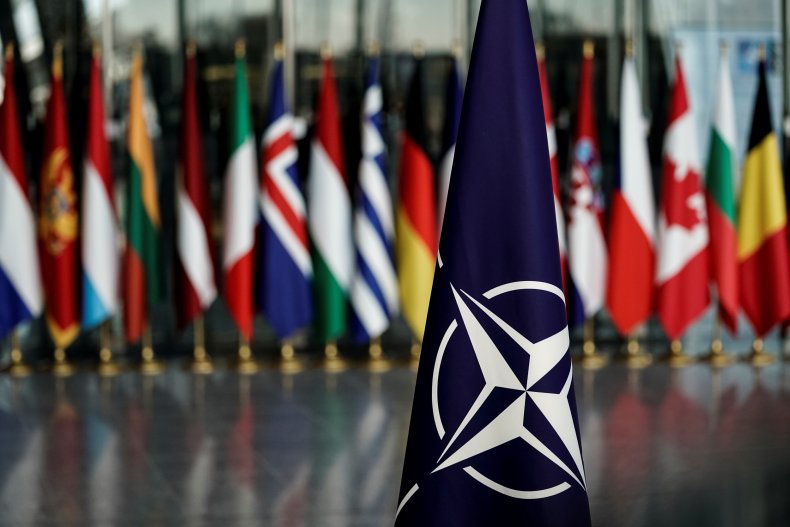NATO is a Military Alliance, Not a Values Club | Opinion
Kicking off an eight-day trip to Europe, the first of his presidency, President Joe Biden delivered a solemn message during his first stop: democracy as we know it is at risk of losing its global relevance. Speaking to U.S. troops stationed at R.A.F Mildenhall, Biden warned that authoritarians like China's Xi Jinping and Russia's Vladimir Putin would like nothing more than to see democratic governance wither on the vine.
"I believe we're in an inflection point in world history," Mr. Biden said. "We have to discredit those who believe that the age of democracy is over, as some of our fellow nations believe."
Halfway through its first year in office, the Biden administration has adopted "democracy vs. autocracy" as the organizing theme of its foreign policy. Secretary of State Antony Blinken devoted an extensive amount of time in his first formal speech to the importance of not only defending democracy stateside, but using the U.S.-led alliance system around the world to contain and counteract the Xis and Putins of the world. Promoting democratic values, in Blinken's view, is just as vital as defending U.S. interests.
NATO, the 72-year-old transatlantic alliance, has served as a chief instrument for promoting those values. Barely a week goes by without a member of the alliance invoking democracy, human rights or the rules-based international order in a speech or a press briefing. Biden and NATO secretary general Jens Stoltenberg talked about building on those values during their meeting at the White House this week.
The irony, however, is that NATO wasn't meant to be dictated by values. At its core, the organization is a military alliance, and preserving the hard-nosed security interests of its members is (or at least should be) the chief guiding principle.
This observation may come as a shock, particularly for those who weren't alive during the Cold War. Ever since the Soviet Union dissolved 30 years ago, NATO has essentially transformed from a military organization expressly designed to contain a hegemonic power into a vessel for the promotion of democratic governance across Europe and Eurasia. The alliance today is about as concerned with consolidating and spreading collective norms as it is with maintaining the security and territorial integrity of its members. NATO, in effect, is operating like a country club: any prospective member that pledges fealty to a certain set of rules and values is eligible to join, regardless of how much it can actually contribute to the alliance militarily.

The problem, of course, is that NATO at its heart is still a defense alliance, with serious defense commitments and responsibilities attached to membership. Countries under the NATO tent not only enjoy the privileges of collective defense from the entire organization, but are duty bound to come to the aid of any member whose security is being threatened. Article 5 of the NATO charter—which stipulates that an attack on one member is an attack on the entire alliance—is both an insurance policy for weaker members that couldn't necessarily defend themselves and a statement of deterrence to adversaries that may otherwise be tempted to act aggressively.
During the 1940s and 1950s, such an arrangement was reasonable and indeed necessary. Hundreds of thousands of Soviet troops were stationed in Eastern and Central Europe at the time. In 1948, Soviet forces, eager to push the U.S., Britain and France out of Berlin completely, sought to cut off supplies to the western half of the German capital and force a Western retreat. While the attempt failed, there remained considerable nervousness in Washington and Western Europe about Moscow making further advances westward. For the U.S., Soviet domination of Europe was simply out of the question.
With the Soviet threat dead and buried, though, Europe is no longer facing a potential hegemon in the east. Cyberattacks, piecemeal annexations of Ukrainian territory and disinformation operations aside, modern-day Russia is nowhere near the conventional behemoth the Soviets were decades ago. A sudden Russian military thrust into the Baltic countries is highly unlikely—and even if Vladimir Putin were reckless enough to attempt it, the costs associated with holding those positions would be too high for the tired, oil-dependent economy to bear.
This doesn't mean NATO will go out of business anytime soon. The alliance's Eastern European members, including Poland, Lithuania, Latvia and Estonia, still have a lingering fear of their large neighbor to the east. NATO (and by extension the United States) is still a warm security blanket for many of them and will continue to be for the foreseeable future.
Even so, the oldest military alliance in the world is trying to figure out what to do with itself. Like a balding, middle-aged man who buys a convertible in an attempt to alleviate a mid-life crisis, NATO is now searching for new missions in Asia and elsewhere, taking in new, insignificant members with vastly inferior militaries and preaching about safeguarding common values in order to give itself a sense of purpose. Through it all, many forget the reason NATO was founded in the first place: to make a hostile invasion of Europe so costly that adversaries refrain from pursuing it.
When President Biden finishes his meeting at NATO's Brussels headquarters next week, we are likely to receive the usual, lengthy joint communiques waxing poetic about the alliance's longevity, successes and solidarity. What NATO truly needs, however, is a clear, honest internal conversation about how it operates, what it should prioritize and why inviting more members in and drifting its attention to Asia makes any sense whatsoever.
Daniel R. DePetris is a fellow with the Defense Priorities think tank, columnist at the Washington Examiner and a contributor to The National Interest.
The views expressed in this article are the writer's own.


